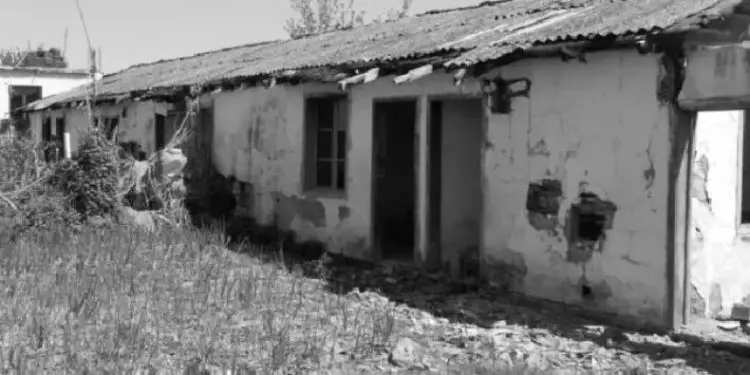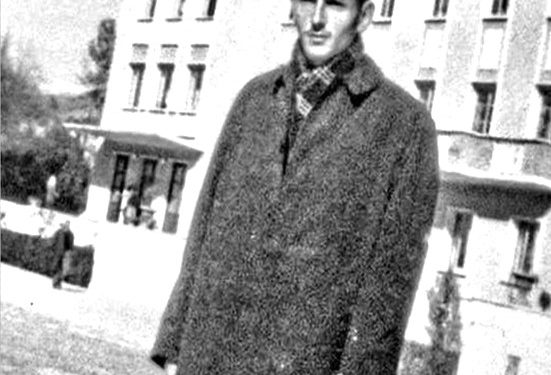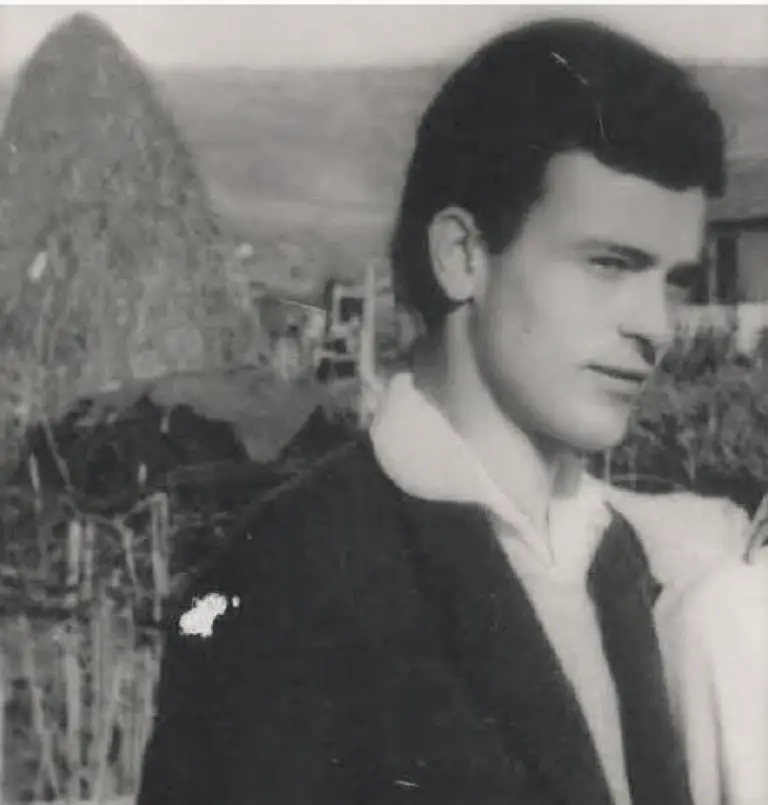From Dine Dine
Memorie.al / “Hey, what are you doing to silence the complaint? Let’s not say it this way, like a man to another man. That’s sabotage. You’ve sabotaged the action, and you know where that leads…?! It means to pour water in the enemy’s mill…” This is how Ahmet Kolgjini tried to imitate the people from Myzeqe, while we were heading to the meeting of the Professional Unions to give an account. Ahmet was not at all inclined to imitate, but that night it seemed he caught a kind of frenzy that made it impossible for him to stop until we approached the meeting door. He laughed continuously, mentioning those puppets who would try to judge us for a sin that we, in fact, had not committed. On Sunday, we had been on an action to trim the grass of the collector’s scrap. Everyone was working in groups. I was working with Ahmet Kolgjini and Sokol Miraka.
Although we were not very knowledgeable about agriculture, since all three of us worked in construction, on Saturday evening, Xhevit Matjani came to my house and told me that the next day we should bring the hoeing tools because the entire collector scrap was covered with gravel. We would need to hoe every 10 minutes, otherwise, we would end up hurting ourselves and wouldn’t accomplish any work. And so we did. This made our work much easier, so we completed it in record time and with quality, even though almost half the time went into hoeing. But let’s continue to recount the events as they happened to clarify how we ended up being accused of something we hadn’t done, but were forced to account and defend ourselves as if we were in a trial.
It was Sunday. We were on an action as usual. An hour before work was over, when the sun was setting, suddenly the supervisor appeared, mounted on a horse. Without dismounting, with a smile that could be seen from afar, he greeted the “volunteers,” sometimes with his head and sometimes with his hands, as if he were seeing Bonaparte himself. But in fact, he strangely resembled Don Quixote, not only physically but also in his actions. He had one weakness that he showed in every circumstance: he demanded to be respected at all costs. And if this wish was not fulfilled, he would provoke a meeting the next morning. After saying a few words about the management of agriculture and future plans, he immediately touched on that weak point. After criticizing some worker, he would address him, outraged, with an outrageous aggressiveness: “And what I want to add is that you should be more respectful, because I have always emphasized this and here I am repeating it again; a butt should rise for a head.”
And thus he would close the meeting, wishing us good work. While we were hoeing, the supervisor approached, and I suggested to my friends that at the very least, we could stand halfway up and salute him with our heads or with our hands. Ahmet burst into laughter, unable to contain himself and agreed to do as I suggested, while Sokoli categorically opposed: “Why should I stand up for that clown?! We’ve spent all day here, and he, mounted on his horse, expects us to stand up and pay him respect! I swear, no way am I going to give him that pleasure!” With the supervisor, Sokoli had clashed several times, and I can say without fear that he had never backed down. This had made the supervisor even angrier. Both of them had an allergy to each other. A year ago, after they had maximized their words against each other, the supervisor did the impossible to have Sokoli transferred from construction to agriculture, and he succeeded! But our friend never forgave him for that kind of revenge.
He completely ignored him. He was perhaps the only one in the sector who never greeted him. This irritated our supervisor to such an extent that it got under his skin. Once, I happened to be nearby when the supervisor, during the lunch break, with measured words and a friendly tone, asked him to unload a truck of chemical fertilizer, so that the driver wouldn’t be delayed. Maybe the supervisor wanted to signal that they could reconcile. This was a kind of tendency for reconciliation that he was trying to make, and now he was finding ways to soften his opponent, forcing him to obey his orders, so he would still be the winner, because even though he wasn’t very clever, he might have felt it deeply. When he realized that Sokoli wasn’t going along with him, he lost his patience, and in a moment he threatened: “I order you!” – “Get lost! You’re not one of those men who can give me orders during my lunch break!” – “I order you!” – the supervisor yelled with all he had – “I order you to follow the order, otherwise you.
Sokoli began to smirk with a certain irony, as if he were openly telling him that he couldn’t care less about his orders. It was clear that both had lost their patience. The supervisor continued to ramble loudly, insisting that he return and follow the order, while Sokoli, who had taken the path home, responded, “Hit the basin, go ahead, because I’m hearing you a lot!” Mad with his reaction, the supervisor, after rambling a few words that perhaps he himself didn’t even understand, shouted, “I have never hit a basin, but you will hear the music of this tune later!” – “If you’ve never hit it, today, here I’m telling you openly that I’m hitting it all day long!” They parted as if they had dueled, one exhausted from work and nerves, having lost his appetite for food, while the other was already thinking of plans for a swift revenge.
This incident had happened a few weeks ago and was still fresh on the supervisor’s mind, which was why it seemed pointless to me that, in that case, we could make a little humor and make the supervisor happy, something he desired so much, and it cost us nothing. Nevertheless, in those circumstances, when he was eagerly waiting for a chance to retaliate, the next morning, as soon as we went out to get the work plan, we were ordered to approach the sector offices, as we had a meeting. Fortunately or unfortunately, on that day the meeting lasted no more than 15 minutes, because right from the first jokes, both sides became agitated and began to exchange insulting words. The supervisor accused the three of us that, during the action, we had not met the standard and had done poor quality work, which meant; “to pour water in the enemy’s mill.” We were the very enemies he was alluding to.
Ahmet was the first to take the floor, trying to explain with facts that we had done a good quantity and quality of work and that Fili (short for Karafil), the channel technician, could be called to testify against what the supervisor was accusing. Ahmet, being quite educated, said these things in a low and measured tone. The supervisor didn’t even let him take a breath. He responded with a barrage of rapid words, convincing himself that he was right without a doubt, and we had to make an auto-critique on the spot, in front of all the workers, as that was the only way to close that matter.
Sokoli was beside himself, as if he were devoured by his thoughts. I gestured for him to be quiet, but he made a dismissive gesture at me. Even though the right was on our side, it was clear that we couldn’t win. The supervisor held the power, a power that, as he often repeated, “had been earned with blood and would be defended with blood if necessary…”! You could have the right, but the moment you claimed that the right was with you, it automatically shifted to the other side, and if you insisted blindly, then your logic was worth nothing because it was the logic of the “class enemy.” Sokoli was barely holding on.
He knew well that if he publicly insulted him, it wouldn’t end well and he could end up like a lamb to the slaughter. He didn’t want to give him that satisfaction. To be punished for insults just for a few moments of relief to release the pent-up anger of years… It wasn’t worth the trouble. To avoid that incident, I took the floor. In a completely calm tone, surely feigned, I tried to argue that this whole matter was simply a misunderstanding and could be easily clarified. The quantity and quality of the work were there. If the channel technician could not be trusted, who had taken over the work, let the supervisor create a commission and verify it on the ground.
The three of us agreed. The wise saying goes: “The worst deaf is he who will not hear…”! But the supervisor didn’t take in any of it. He interrupted me and mentioned the names of three or four people to move around and discuss, since not a single voice piped up, as 90% of the workers had been on the “voluntary work” action, and they knew that only our trio and two or three others had taken on the work, so there was nothing for them to discuss.
The first to take the floor was a farmer from Krutja. A local native, he had held several positions in the village, such as party secretary, front chairman, etc. In the end, all his dirty laundry came to light, and as punishment, he was expelled from the cooperative and ended up as a worker on our farm. It should be said that it was better to be a farm worker than to hold any position in the village. Here he received money, while there he earned points! Points and money were worlds apart. With points, you couldn’t even secure corn bread, whereas with money, you could buy wheat bread and support your whole family. The work for points was like the proverb: “The rabbit in the forest, and the cauldron on fire.” The state plan wasn’t fulfilled… and the points evaporated.
Thus, Loni owed the supervisor so much that he didn’t know how to repay him. But the supervisor, after all, had obligations too, since he was also a fellow villager and had shared meals and toasts with him countless times because they had a long-standing connection. That’s why he had done him that favor. Ultimately, “a good friend is there in difficult times.” It was Loni’s turn, undoubtedly, to repay his friend. After all, words didn’t cost anything. But in reality, he found it difficult because the words wouldn’t come out of his mouth. He chewed and was mulling over his thoughts, and it seemed to me that the burden on his back had become even heavier, like a camel’s hump from the torture, if he could defend his friend properly!
At that moment, the supervisor, who certainly lost his patience, snapped at him in a sharp and terse tone: “Hey Loni Shtembari, speak up because all these people in front of you are waiting to hear your word!” It seemed as if he were shouting, as loud as his vocal cords would allow: “Are you looking to defend the class enemy?! Is this where you’ve gotten to, Loni Shtembari?!” After pondering for a moment, Loni began: “Well, how should I judge it, my friends, how can I say it? Is it right to say that the supervisor is wrong?! Surely, it is evident. Why should the supervisor lie, what interest does the supervisor have in criticizing?”
“He is simply implementing the decisions of the Party. That’s why the government and the Party placed him there, to open his eyes and carry out the decisions to the end. Why should we move forward like this? No, we cannot move forward like this! The supervisor speaks with the voice of the Party, and the voice of the Party must prevail, my friends. There is no person born from their mother’s womb who can oppose our Party! That’s why I say once again, I fully agree with the remarks that the supervisor made, and I urge my friends to admit their mistake and even to make an auto-critique, because in the end, it doesn’t hurt anyone. That’s all I have.”
Sokoli went completely pale. As soon as he opened his mouth, I intervened to not let him speak: “I only had one question for Loni. I don’t want to go through his biography. Most know it. He himself knows well why he was expelled from the cooperative. But this does not relate to the question I want to ask Loni. I want to ask him if he was in action yesterday or if he is just speaking randomly? If he wishes to stand by the supervisor without having any facts against us, this simply sounds like hypocrisy! But even hypocrisy has its limits. I know he might love and even adore the supervisor, and that is understandable since they have ties and friendships that go back a long way… but instead of making an auto-critique for himself for not having the goodwill to respond to the action, he comes to criticize us for not having done quality work…?”
Sokoli could no longer hold back; suddenly he interrupted me: “To blindly support every person, even if it’s the supervisor, without knowing the truth and without having any facts, is a mistake that doesn’t honor even the supervisor himself. The supervisor likely doesn’t even know that you weren’t in action at all, but even if he did, just the fact that not a single worker is opening their mouth because they know the truth, and that truth is known to be on our side, should not allow him to pressure the workers to echo lies. And the most paradoxical thing (Sokoli used a word that surely no one knew the meaning of) is that…!”
The supervisor was furious. He interrupted Sokoli and solemnly declared: “Sokol Miraka, Ahmet Kolgjini, and Dine Dine, report to the meeting of the Professional Unions in the evening.” The meeting is declared closed! Pale as a candle, he vanished like a shadow and finished in the nearby office. The workers, along with the brigadiers, dispersed to the place where the work plan was distributed. There was a general whisper, a buzzing like that of bees. It was approaching 7 o’clock when someone informed us that the meeting was about to begin.
As I mentioned at the beginning, Ahmeti had been inspired to make jokes, and we laughed and laughed until suddenly Sokoli proposed: “Hey uncle Ahmet, let’s appoint you as our lawyer, to defend us with dignity. You have vast knowledge, a broad culture, you speak foreign languages, you’re married, you have prison experience, you even know about magic, so you could hypnotize those fools and seal their mouths so they wouldn’t be able to respond or accuse us. With your presence, especially with your somewhat unique gaze, you will appear to them as an extraterrestrial being. Besides, you will have a chance to showcase your oratory, which you always cover with silence.
From the very beginning you will convince them that this event is an absurdity that should not be allowed to anyone, especially a supervisor. But surely, since the issue is somewhat delicate, you will find the right words so that they won’t take offense; otherwise, they would jump on you, and you would completely lose your composure! You can be so reckless! If some rash word slips out, we are done for. They will mention the prison; they will put you back in prison, poor thing, and for all this mess, I, who proposed you as our lawyer, will bear personal responsibility – then he added again: – Come on, come on, I’m just kidding, don’t be afraid; you’re not the kind they would let their dogs eat the stick!”
We had approached the door of the hall, or rather the stable, and Ahmeti, who had the trait of not interrupting you, was just laughing. Before we pushed the door, he paused for a moment and said: “With this lecture you’ve given me, I feel incapable of representing you, and second, the Party has removed lawyers from here; the people know how to defend themselves,” and without allowing Sokoli to continue with the humor, he knocked on the door. The stable was completely full. Not even a fly buzzed, which gave the meeting a kind of solemnity. On the podium sat, one after another, the Chairman of the Council, the Party Secretary, and the Chairman of the Professional Unions, who was also the people’s judge.
The Chairman of the Professional Unions took the floor. Briefly, he referred to the event in general and the accusations made against us specifically by the sector supervisor, and requested that we take the floor. The first to rise was Ahmeti, as he stood first in line, and the chairman pointed his finger at him. Ahmeti spoke briefly, informing the presidium that: “Last night, the channel technician handed over the work to us, and two or three others and when he left in the presence of all the workers, he said: ‘Those in construction have done quality work, more than all the others.’”
“This is the whole issue. I don’t know anything more.” The second to speak was Sokoli. He seemed agitated. Even though he was trying to remain calm, his face betrayed him. He directly accused the supervisor of being vengeful and asked the presidium, “How is it possible that a person holding a high state position dares to accuse without arguments, without facts, just because for one reason or another, he feels like taking revenge?!”
“Friends,” Sokoli continued, not without a hint of irony, “this is simply revenge, and to illustrate this, I could give you dozens of facts, but this is not the place for that, so make sure you hold the supervisor accountable for the facts, because all those present here at this meeting know it, so take the trouble and come judge us!” The party secretary intervened, suggesting to Sokoli to lower his voice a little and not to use words like “vengeful.” He primarily defended the interests of the Party and the people, and they couldn’t allow his name to be confronted.
“Secondly, you should know well that tonight we have gathered to judge you, not the supervisor. It’s better to make an auto-critique and end this meeting than to engage in talk and spend the whole night drumming without coming to any conclusion.” Sokoli could no longer endure; he suddenly interrupted me: “But what if we told the supervisor to retract the accusations, simply because it was a misunderstanding, and let us be at peace with our troubles and problems…?” The party secretary saw clearly that we were getting nowhere and were just treading water, so he pointed his finger at me.
I rose, not without emotion but with a feigned self-restraint that was unnatural for me, since Sokoli had drained all the batteries. I repeated what Ahmeti and Sokoli had said together, avoiding the words revenge and not mentioning the expression that Sokoli had uttered with unprecedented rage; “that the supervisor retracts his accusations,” which was absurd, and I concluded by saying that “no matter what happened, the three of us would never make an auto-critique,” even emphasizing that we should take the issue to court, where the truth would be separated from the falsehood.
“But if we really did sabotage anything, we are ready to accept our responsibilities and, why not, to make an auto-critique, just as the Party requires.” No one opened their mouth. The party secretary addressed those present, asking if anyone wanted to speak. No one raised their hand. In fact, to everyone’s surprise, not even Feçor Pirra, a brigadier and once a party secretary, one of the most negative people I had encountered in my experience. Megalomaniac, vengeful, critical at every turn and of anyone. Unprecedentedly ignorant.
A prototype of those people who know nothing and think they know a lot—qualities that made him detestable, and he displayed them in every context, often boasting about them. But the surprise didn’t last long because, in the end, he asked to speak. I don’t want to bore the reader with his nonsense. He spoke the whole time only nonsense, but always in the name of the Party and the People, as their legitimate representative, and this was the rhetoric that gave him both confidence and authority. All his speech focused on the question: “How is it possible for the supervisor to slander?!”
“Why don’t these three make an auto-critique, as the Party requires, and let’s end this meeting, instead of wasting time with gossip, leaving all these conscious workers awake, who tomorrow morning will rise early to fulfill the tasks assigned by the Party for the good of the people?” Sokoli had lost his patience again. I had as well. We both stood up at the same time, but Sokoli spoke first: “Do you realize what nonsense is coming out of your mouth, Feçor? Luckily, you don’t know, because you would be disgusted with yourself!”
“Oh, don’t open your eyes at all…!!” The party secretary, wanting to prevent the situation from turning into a scandal, interrupted both of them, but Feçor, feeling insulted, couldn’t hold back and burst out again: “You’re chasing after the Anglo-Americans!” – “What do the Anglo-Americans have to do with this, you fool! Do you realize that every time you open your mouth, you spout nonsense by the sackload?” Feçor’s “personality” was soiled like never before!! The party secretary, although uneducated, must be acknowledged for understanding that too much noise was being made over nothing, and declared a 10-minute break. Everyone, albeit sluggishly, went outside. I don’t know why, but Hekurani, the party secretary, called me aside in a corner. “Listen, Dino, I’m talking to you man-to-man.
What I’m telling you here stays between us. I know that the supervisor was offended because you didn’t stand up to greet him. Let’s be sincere… we checked everything with these friends. We were at work. We even took Fili with us. You’re right, what can I say? You have a point. Just make some sort of auto-critique, however you want, and we’ll accept it. Just the mention of the word auto-critique is enough. We’ve had six hours, Dino. We’re exhausted. Let’s go and sleep because we’ll be up early tomorrow. Just do it as you see fit, as the supervisor has no interest in prolonging this. He knows better than you and me that he has no right. So let’s get out of here since we’re just wasting time. I’m telling you this on my part!”
I didn’t argue; in the end, we decided and went back inside. Everyone was anxiously waiting to see how the auto-critique would unfold. Neither Ahmeti nor Sokoli had any idea what I had discussed with Hekurani. When everyone settled down, I stood up and after a pause, while everyone anticipated what would be said, I finally expressed: “Comrades! I don’t want to repeat what has been discussed for six hours straight, as it’s clear to everyone that all three of us, yesterday in action, did exemplary work that would honor each of us. This was confirmed by the channel technician who took over the work, and it was verified by the comrades who are leading this meeting tonight, and by all of you who are present here, right up until the last minutes when the action ended.
However, there are also some other things, comrades, that may seem trivial and unimportant to some, but in fact, they hold their own significance. I reflected long to understand where the hitch was, that made the supervisor seem so dissatisfied and arrogant towards us. When he passed by, mounted on his horse, none of the three of us bothered to greet the supervisor. And do you know why? We were exhausted and were busy hoeing; our entire attention was focused on the quality of the work, which we achieved. And we are proud of it. So, this was the reason we didn’t even manage to give a wave to the supervisor. This is the truth, and if this is considered a mistake, then the words I expressed should be considered as ‘Auto-critique.’”
“—Well, then it’s done! Now make the auto-critique. With that, the meeting is over!” As we were leaving, I approached Ahmeti: “Do you want to say something about Beluli?” While he continued to laugh heartily, I wondered what was playing in his mind. Perhaps one day he would describe these tragicomic episodes with the precision and wisdom that characterized him. Nevertheless, when we dispersed, everyone remained satisfied. The supervisors were told: “They accepted it; they made the auto-critique…”! Hekurani was grateful for the word I had spoken, even though that word had put the supervisor in a position, just like Don Quixote. Sokoli was no longer on his back as before…! He continued working in construction until the day the dictatorship collapsed. /Memorie.al

















